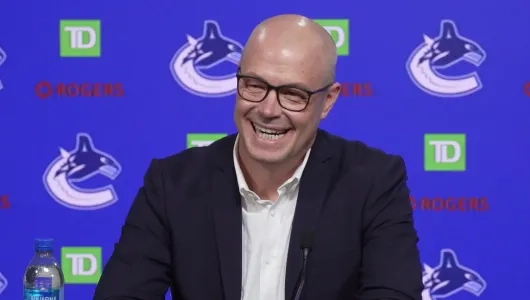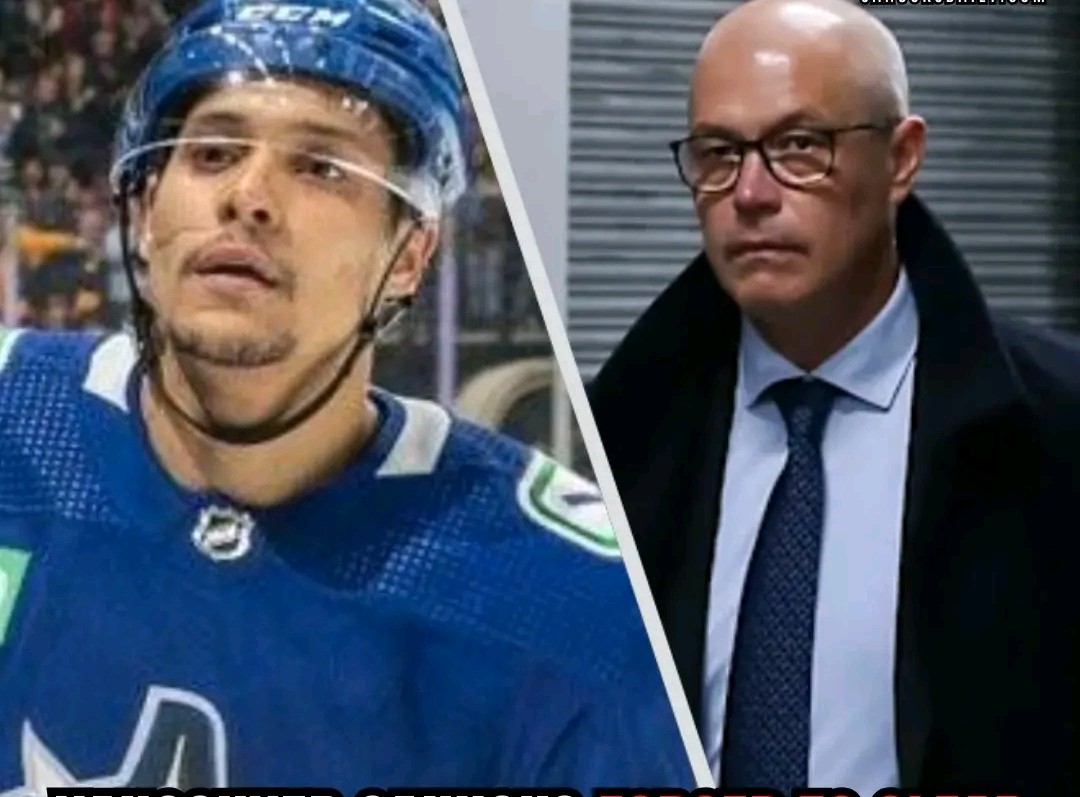Vancouver Canucks Confirm Adam Foote as New Head Coach Amid Mixed Reactions and High Hopes
The Vancouver Canucks have officially named Adam Foote as their new head coach, concluding a period of speculation and anticipation that followed the departure of former coach Rick Tocchet earlier this offseason. The decision was confirmed by NHL insider Darren Dreger and later announced by the team, sparking a mix of excitement, skepticism, and hope among Canucks fans and media alike.
Foote, a former NHL defenseman who played most of his career with the Colorado Avalanche, brings a blend of playing experience and relatively limited coaching tenure to the position. Though this appointment has generated optimism among some within the organization—particularly players like team captain Quinn Hughes, who reportedly supports the move—critics have already voiced concerns over Foote’s limited resume as a head coach at the professional level.
Before taking the helm in Vancouver, Foote served on Rick Tocchet’s coaching staff with the Canucks. His prior head coaching experience came in the junior ranks, where he led the Kelowna Rockets of the Western Hockey League (WHL). This background, while giving him some leadership familiarity, falls short of the extensive NHL head coaching experience many fans were hoping for in the next person to steer the Canucks forward.
Adding to the complexity of the decision was the fact that Foote wasn’t the only candidate under consideration. Manny Malhotra, a former NHL forward and assistant coach for both the Canucks and Toronto Maple Leafs, was also in the mix. Most recently, Malhotra held the head coaching role for the Abbotsford Canucks, Vancouver’s AHL affiliate. His presence in the running indicated that the organization was weighing a variety of options, including coaches already deeply embedded in their system.
However, it seems the familiarity and connection that Foote has with the current NHL roster ultimately won out. As a member of Tocchet’s staff, Foote had direct experience working with many of the Canucks’ core players during the most recent campaign. That insight—into both player dynamics and individual skill sets—was likely seen as a strong asset by General Manager Patrik Allvin and the rest of the team’s front office.
Still, Foote’s appointment has not gone without pushback. Almost immediately following the official announcement, fans and analysts took to social media to question the wisdom of the choice. The central concern is that Foote lacks the experience necessary to guide a team with playoff ambitions. Vancouver has struggled to establish consistency and progress over the past few seasons, and for some observers, turning the team over to a coach without a strong track record as an NHL head coach feels like a gamble.
Despite the criticism, there are reasons for cautious optimism. Foote’s defensive acumen—honed during his years as a standout blueliner in Colorado—could be instrumental in helping to stabilize the Canucks’ own-zone play, an area that has plagued them at times. Additionally, his existing rapport with the players may create a more seamless transition and foster a stronger locker-room culture, something often cited as critical for long-term success.
Perhaps even more important is the reported support Foote has from Quinn Hughes, the Canucks’ star defenseman and captain. Hughes’ buy-in could play a pivotal role in ensuring that the locker room rallies around the new coach. In today’s NHL, the relationship between a coach and his top players often shapes the team’s internal chemistry and on-ice execution. If Hughes is truly aligned with Foote’s vision and methods, it could help defuse early skepticism and bring stability during the transition period.
While some might view the team’s deliberate pace in making the decision as a sign of uncertainty, others interpret it as careful due diligence. Naming a new head coach is a pivotal moment for any franchise—especially one still working to climb back into postseason contention—and Canucks management appeared to take this responsibility seriously. By not rushing the process, the front office may have given itself the space needed to select someone who aligns with both short-term needs and long-term vision.
The task ahead for Foote is considerable. Expectations are rising in Vancouver, and fans are desperate to see their team take meaningful steps forward. Missing the playoffs in recent years has eroded goodwill and placed increased scrutiny on organizational decisions—from player acquisitions to coaching appointments. Foote now inherits a group with high-end talent but inconsistent results, and it will be up to him to guide them toward sustained competitiveness.
In his new role, Foote will also face the challenge of developing younger players while getting the most out of seasoned veterans. Balancing these demands requires both tactical knowledge and strong communication skills. If he can draw from his playing days, apply lessons learned under Tocchet, and build trust quickly, he may be able to calm critics and generate momentum heading into the new season.
Ultimately, the Canucks’ decision to promote from within and invest in a coach still growing into the position signals a willingness to take calculated risks. Whether this move pays off will depend largely on results—and in the NHL, those results must come quickly. For now, Vancouver fans will wait and watch as Adam Foote takes the reins, hoping that his leadership marks the start of a promising new chapter.



